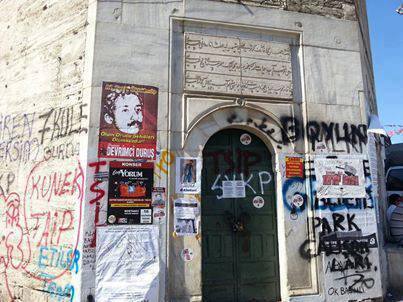
« Peaceful environmentalists » protesting for trees but pillaging the history. This Ottoman era fountain has been sprayed, its brilliant ornaments and inscriptions were damaged.
Since the final days of May, nation-wide demonstrations in Turkey have taken place against Turkish Prime Minister Recep Tayyip Erdogan and his Justice and Development Party (AKP) government. Mainstream Western media coverage and analysis have labeled these demonstrations the « Turkish Spring, » a questionable reference to the Arab Spring.1 In order to explain the recent protests in Turkey’s Taksim square, the majority of experts have compared them to the ones which happened in Tahrir square of Cairo in the 2010-11 period.2 The term « Turkish Spring » has to be deconstructed, and those who equate Taksim to Tahrir should reconsider the history of democratisation and the backgrounds of Turkey’s opposition and ruling parties, namely the AKP and the Republican People’s Party (CHP).
In fact Erdogan’s AKP is a democratically elected party, has attempted to end the long-lasting Kurdish-Turkish conflict and provided freedoms to the other minorities in the country, and initiated Turkey’s EU accession negotiations. The largest Eurosceptic party in Turkey3, in contrast, has been the main opposition party the CHP, which also has a very questionable history of humanitarian crimes and ethnic assimilation projects towards Kurds, Greeks, Armenians and Jews.4 It is thus difficult to argue that there is an Arab Spring-like movement against a dictator in Turkey. AKP’s liberal moves in politics and economics clash with this dubious definition. However the considerable majority of the protesters have expressed their support to the ex-military juntas by inviting army to intervene in Turkish politics. Other leftist-nationalist groups and extreme leftists of Turkey have also played a role in these nation-wide protests. Yet, there is no single political ideal to this movement, it is mainly composed of people from the 50 percent of people who did not vote for Erdogan, and the majority of them are the voters of the CHP, who incited four military interventions and numerous ethnic assimilation projects. It is incontestable that within his party and country, Erdogan is turning to an unavoidable autocracy, as the recent Sledgehammer court case unveiled republican-led coup attempts to Erdogan’s government, which were also supported by other marginal opposition groups who are protesting against the government on the grounds of environmentalism in Taksim.
Erdogan’s party is extremely popular, unlike the overthrown Arab dictators. In the last elections, it gained the 50 percent of the total votes. As the main opposition party the CHP gained only 26 percent of votes. What has made Erdogan more powerful has been the eradication of pre-2002 parties from the political arena which left Turkish parliament to four major players: The AKP (Muslim democrat, neo-liberals), CHP (Nationalist, republicans), MHP (Nationalists, far right), and the BDP (Leftist, pro-Kurdish). Erdogan’s opposition has been extremely weak on an electoral basis. Furthermore, the Gezi Park events show us a very interesting unification of the previously clashing of opposition movements, with the majority of protesters either being supporters of leftist parties or the nationalist republicans and demanding an action against the Muslim-democrat and neoliberal AKP. Democratic accountability of the AKP has not been limited to the 50 percent of the Turkish electorate, as the leaders conveyed a message that they represent the whole country even if they did not vote for the AKP. In practice, one may question whether Erdogan really represents the other 50 percent. In the recent days, the limitation of alcohol sales, existing internet filters for adult web sites, and the destruction of a tiny green space incited thousands to protest against the government in the streets. On the grounds of environmentalism, protesters are critical of Erdogan’s politics, which is supported by the majority. That is to say, political minorities want a voice which is above and beyond their numbers in the Turkish democracy. Of course while the mode of action of the protesters is problematic, so are the suppression tactics of the police in Turkey.
Among the Gezi protesters a widespread vandalism threatens the public safety and the image of Turkey, which has been the fourth biggest tourist destination in the world in 2012. Bus stops, public buses, and shops are pillaged by certain groups within the protesters. It is clear that that riot police has employed a massive amount of force against these protestors, though it is not very different from Spanish, Italian, Greek, and British police tactics. In Europe similar amounts of forces were employed to pacify the protesters against austerity measures. None of these European events were considered as a British, Greek or Spanish “Spring” or “Summer.” All in all, Turkey’s neo-liberal Muslim-democrat party made a mistake by not listening the voices of the diverse critics against the AKP government, which exasperated thousands of young men and women from the opposition groups. However, the mainstream terminology used by the Western media and experts is highly problematic. The most critical thing to note and address should be the excessive international media coverage of these events at a time when the deadly blasts are killing dozens in Iraq, Syria, Myanmar and elsewhere in the world.
Adnan Riza Güzel
MA Candidate in International History & Politics @IHEID
BA in History, Koc University
[3]http://changingturkey.com/2010/10/11/causes-and-types-of-euroscepticism-by-the-republican-peoples-party-chp-and-nationalist-movement-party-mhp-of-turkey-by-can-buyukbay/
[4]See the 1934 Thrace pogroms against Jews, the Dersim Massacre in 1937-1938, the Capital Tax of 1942 [Varlik Vergisi] took place during the single party era under the leadership of CHP [RPP]:
i)http://www.tandfonline.com/doi/abs/10.1080/00313220600634238#.UcDvwfYpavU
ii)http://igitur-archive.library.uu.nl/let/2007-0320-200735/UUindex.html
iii)“Genocide of the Kurds” by Martin van Bruinessen in “The Widening Circle of Genocide” by Israel W. Charney, Transaction Publishers, 1994.
iv)http://www.tandfonline.com/doi/abs/10.1080/00263207208700205?journalCode=fmes20#.UcDwt_YpavU





Hello, I do agree about the false comparaison of mainstream media who as usual tries to put events into boxes…